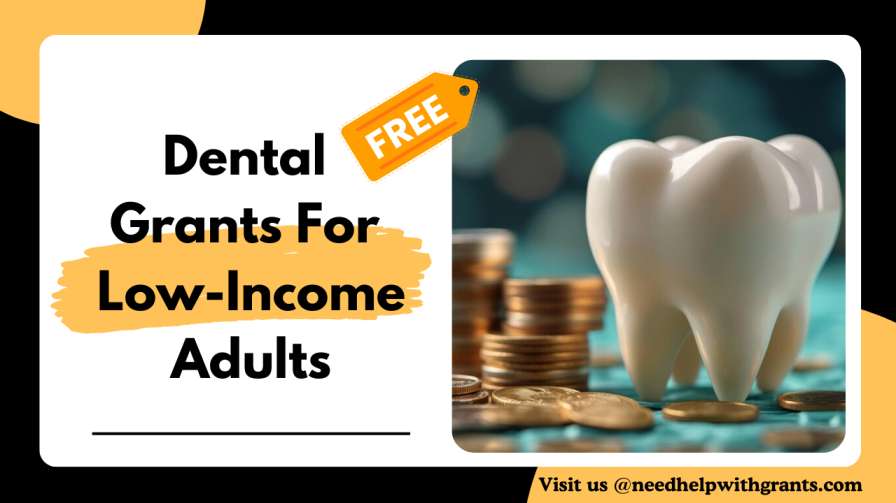How To Find Dental Grants For Low-Income Adults: Navigating the healthcare system can be challenging, especially when you need dental care and financial resources are limited. My journey to finding dental grants for low-income adults was a combination of perseverance, research, and community support. Here’s how I did it and some tips that might help others in similar situations.
It all started when I faced a serious dental problem that required immediate attention. The pain was unbearable and I knew that ignoring it would only make things worse. However, the cost of dental treatments was far beyond my reach. With limited income, I had to explore alternative options to afford necessary dental care.
How Can I Find Dental Grants For Low-Income Adults Near Me?
The first step in my journey was to conduct extensive research. I started by searching online for dental grants and assistance programs aimed specifically at low-income adults. This led me to several resources, including:
- Government Programs
I discovered that there are federal and state programs designed to help low-income people receive dental care. Medicaid, for example, offers dental coverage in some states. Checking your state’s specific provisions is essential, as coverage varies.
- Nonprofit Organizations
Numerous nonprofit organizations provide dental grants and financial assistance. I found organizations like Dental Lifeline Network and America’s Dentists Care Foundation, which offer support to those who need it.
- Community Health Clinics
Many community health clinics offer dental services on a sliding fee scale based on income. I located several clinics in my area that provided affordable dental care.
- Dental Schools
Dental schools often have clinics where students provide care under the supervision of experienced dentists. These services are generally offered at a reduced cost.
- Dental Lifeline Network
This program provides comprehensive dental care to vulnerable people with disabilities, seniors, and the medically fragile.
- America’s Dentists Care Foundation (ADCF)
They host Missions of Mercy (MOM) events, offering free dental care to those in need.
How To Apply for Free Dental Grants?
Once I had a list of potential resources, the next step was to apply for grants and assistance programs. This part of the process required patience and organization. I gathered all necessary documentation, including proof of income, residency, and medical history.
Here are some tips for applying:
- Research: Start by researching available grants. Websites such as Dental Lifeline Network and the American Dental Association Foundation provide information about various grants and how to apply for them.
- Eligibility: Please see the eligibility criteria for each grant. Some grants are specifically for seniors, people with disabilities, or people with specific medical conditions.
- Application Process: Please follow the application process carefully. This may involve filling out forms, providing proof of income, and detailing your dental needs.
- Community Health Centers: Visit local community health centers and ask about available dental grants. These centers often have information about local and national grant programs.
- Follow-up: After submitting requests, follow up periodically to check the status. Perseverance can make a difference.
- Receiving Support: After weeks of waiting and following up, I received positive responses from a couple of nonprofits and a local community health clinic.
Types of Free Government Grants for Dental Implants
Here are the types of free government grants for dental implants.
Medicaid
It is a joint program supported by the federal and state governments. This program primarily offers medical coverage, extending to dental care. If you qualify for Medicaid, you can probably cover most of the costs of your dental implants.
To qualify, you must:
- Provide valid proof of residency.
- You must be a US citizen or permanent resident.
- Meet specified age and financial eligibility requirements (which vary depending on state regulatory laws).
- If approved, patients can enjoy a variety of dental and healthcare services at little or no cost. For example, it can cover consultation fees, hospital stays, prescription drug costs, and preventive care.
Dental Grants For Seniors by ADA Foundation
Local community health centers may also offer dental grants to seniors who cannot pay. For example, the American Dental Association (ADA) Foundation frequently partners with nonprofit organizations and provides dental care assistance to seniors (ages 62 and older).
Dental Grants For Veterans
Several foundations offer dental implant coverage, specifically for veterans. So if you qualify, you can search for dental grants on the Dental Lifeline Network. It also partners with the ADA Foundation to offer various types of implant grants. The time it takes to get approved can vary greatly, depending on the organization and the type of grant you qualify for.
Dental Grants for Cosmetic Dentistry
Government grants may not be available for cosmetic dental implants, as they often support dental implant procedures that are considered “medically necessary.” In that case, you might consider the following grants:
- The Samuel Harris Fund
- California Dental Scholarships
- CHFFA Specialized Scholarships (California)
- Cosmetic Dentistry Scholarship (CDG)
In particular, you may have to pay some out-of-pocket costs because these grants may not provide completely free or subsidized dental implants.
- Read More: Free Government Grants for Dental Implants
Dental Insurance
A dental insurance plan with full coverage is undoubtedly the best way to get free dental implants for low-income people. But even having a private insurance plan with partial dental coverage can make getting dental implants much more affordable. Insurance can cover a wide range of dental treatments, as well as associated dental expenses, including hospital stays. However, most plans do not cover cosmetic dentistry treatments.
- Read More: Free Life Insurance For Low-Income
Dental Loans or Credit Cards
You can also use medical credit cards like CareCredit, AccessOne, and Medkey. Or there are other financing options, such as CarePayment and AfterPay, that can help pay for dental implants. They are ideal when you can’t pay with insurance. However, they have different advantages and disadvantages. So make sure you pay on time or it could negatively affect your credit.
Dental Payment Plans
Some dental providers even offer payment options to patients without any credit checks. For example, today, many dental providers offer Credee dental payment plans as an alternative option. It helps patients receive dental treatments immediately without having to pay a large sum at once.
FSAs and HSAs
Many Americans use their Flexible Spending Account (FSA) to cover out-of-pocket medical expenses. Money in the FSA is tax-free and has no state or federal deductions. You can use it for certain specific medical expenses. So be sure to check if dental implants are covered under qualified treatments. You can also set up a personal Health Savings Account (HSA) to prepare to pay for dental implants. It is generally feasible for people who have high-deductible health plans.
Conclusion
In conclusion, it is possible to find dental grants for low-income adults with determination and the right approach. My experience taught me that help is available if you are willing to look for it and put in the effort to ask for it. If you are facing a similar situation, I hope my story provides you with guidance and encouragement.
If you have any specific questions or need more help, don’t hesitate to ask!



